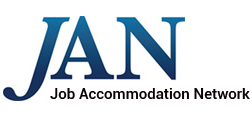Strands & Strand Advisors
Strands
The ATIA 2026 education program is planned around nine strands to provide a balanced approach to explore the most important questions and issues facing AT professionals today, providing you the opportunity to focus on a specific area of interest or need. A complete list of ATIA 2026 education sessions will be available in September.
The strands are:
Aging & AT
Supporting Partner:
![]() These sessions concentrate on assistive technology (AT) devices and services for aging adults to be independent, safe, age in place, and thrive at home, at work, and in their communities.
These sessions concentrate on assistive technology (AT) devices and services for aging adults to be independent, safe, age in place, and thrive at home, at work, and in their communities.
AT to support aging includes a range of activities and domains such as fall/wandering prevention, kitchen safety, medication management, home monitoring, social engagement, telework, and much more.
This strand will also focus on AT delivery systems for aging in place; AT funding mechanisms; research including the return on investment of AT for aging; reducing caregiver burnout with AT; home modifications for aging in place; and other aging and AT-related systems.
Who would benefit from this strand? All stakeholders and service providers in the “Aging in Place” movement as well as anyone helping those who are aging to thrive in their communities no matter where they live. These include:
- Nurses
- Money Follows the Person Transition Coordinators
- Medicaid Waiver case managers and other social workers
- Occupational therapists
- Physical therapists
- Speech-language pathologists
- Rehab engineers
- AT professionals
- Aging researchers
- Certified aging-in-place specialists
- State government aging services
- Area agencies on aging
- Those who support aging adults with intellectual and developmental disabilities
- Consumers and their loved ones, including family care partners such as spouses and adult children of aging parents.
Topics include but are not limited to:
- All areas of AT devices for aging, such as:
- Bedroom, bathroom, eating, cooking
- Community participation
- Computer/mobile device access
- Daily living
- Dementia
- Elopement, wandering, tracking
- Emergency Alerting Systems
- Environmental adaptations for aging in place
- Falls prevention
- Learning, cognition, and memory
- Medication management
- Mobility
- Recreation, sports, leisure activities
- Reducing caregiver workload and burnout
- Smart home products for independence and monitoring
- Social engagement
- Speech communication
- Transportation
- Wearables
- Work and volunteering
- Vehicle modifications
- Vision and hearing loss
- AT services related to aging, such as:
- AT acceptance and use
- Building accessible homes with aging in mind
- Programs to help people age in place
- Robotics
- Transitioning out of institutions
- AT funding to help people age in place, such as:
- Medicaid waivers
- Money Follows the Person
- Research in aging and AT, such as:
- Evidenced-based programs for aging in place
- Return on Investment (ROI) of AT to age in place
- Studies on AT devices for aging
AT for Physical Access & Participation
Supporting Partners:
![]()
Sessions focus on improving function, access, and meaningful participation by individuals with disabilities or functional limitations through the use of a continuum of assistive technologies (AT) including those acquired commercially off the shelf, modified, or custom-made, as well as address barriers related to aging in environments and communities such as school, home, work, recreation, and general public access.
Sessions in this strand will focus on emerging and existing technologies or systems for: Alternate keyboard/mouse, eye gaze, head pointers, scanning, switches, innovative text entry, environmental control units (ECUs), mobile devices and apps, mounting devices, functional seating and mobility, home modification, activities of daily living, adaptive recreation and sports, and improved public access.
Topics in this strand may be of special interest to:
- Occupational therapists
- Physical therapists
- Speech-language pathologists
- Special educators
- Engineers
- AT professionals
- Transition coordinators
- Independent living specialists
- Makers
- Consumers
- Others who support individuals with physical limitations that may impact access, participation, productivity, and achievement.
Topics include but are not limited to:
- Accessible toys, play, and playgrounds
- Adaptive recreation and disabled sports technologies
- Aging in place
- Community access technologies
- Computer access technologies
- DIY approaches to AT
- Employment access
- Environment access
- Ergonomics
- Functional seating and positioning
- Home access technologies
- Independent living
- Instrumental Activities of Daily Living (IADLs)
- Leisure
- Maker contributions to AT
- Rehabilitation
- School/education environments
- Transition to environment/community
Augmentative & Alternative Communication
Supporting Partner:
![]() Children and adults with complex communication needs (CCN) due to developmental or acquired disabilities may benefit from augmentative and alternative communication (AAC) devices and services. Sessions in this strand focus on the ways in which existing and emerging technologies, tools, and strategies are used to enhance communication, language, literacy, and independence across the lifespan. All skill levels are welcome; submissions with intermediate or advanced content are strongly encouraged.
Children and adults with complex communication needs (CCN) due to developmental or acquired disabilities may benefit from augmentative and alternative communication (AAC) devices and services. Sessions in this strand focus on the ways in which existing and emerging technologies, tools, and strategies are used to enhance communication, language, literacy, and independence across the lifespan. All skill levels are welcome; submissions with intermediate or advanced content are strongly encouraged.
Topics include but are not limited to:
- AAC assessment approaches, models, tools, and outcomes
- Culturally responsive practices
- Ethical issues in AAC
- Development and use of visual supports
- Using AAC to build language and interaction
- Effective AAC intervention strategies
- Alternative access strategies for both written and face-to-face communication
- Implementation issues, such as generalization to real-world settings, teaming, and collaboration
- Family supports for AAC
- Partner training and support
- Funding for AAC devices and services
- Interprofessional practices
- Literacy supports for people who use AAC
- Pre-service training, supervision, and professional development in AAC
- Public policy issues that impact AAC, including licensure and credentialing
- Service delivery models
- Speech generating device (SGD), mobile device, AAC app, and interface design, features, and functionality
- Supports for high-quality AAC services in educational, healthcare, and community settings
- Technologies for teaching AAC skills
- Telepractice
- Vocabulary selection, development, and teaching
Education & Learning: Early Intervention – 12/Higher Education
Supporting Partner:
![]() Submissions in this strand should focus on the effective implementation of assistive technology (AT) with students in early childhood, K–12 educational programs, higher education settings, including university/community colleges and trade schools.
Submissions in this strand should focus on the effective implementation of assistive technology (AT) with students in early childhood, K–12 educational programs, higher education settings, including university/community colleges and trade schools.
Topics in this strand typically include the implementation of AT, accessible educational materials (AEM), and other inclusive technologies within face-to-face, remote, hybrid, and homeschooling environments.
Presentation proposals should be submitted from:
- AT professionals
- Educators
- Parents
- Disability student service providers (DSSP), and/or support staff working with students who have learning disabilities, dyslexia, intellectual disabilities, autism, and/or multiple disabilities (sessions for students with vision and/or hearing impairments should be submitted to the Vision & Hearing Technologies Strand; sessions for students using AAC should be submitted to the AAC Strand).
- Students, family members, and pre-service teachers are especially welcome as part of the presentation team.
Submissions involving AT implementation processes, including agency-wide integration strategies are encouraged. This strand will highlight strategies and case studies that have been effective in improving retention, self-determination, and graduation rates for students.
Submission of multiple products or systems are preferred over single-product-related presentations. Product demonstrations will be assigned as a vendor session. It is imperative, since ATIA is an AT conference, that your presentation addresses the utilization of AT within early intervention–K–12 or postsecondary environments. Sessions that do not include AT will not be considered.
Topics include but are not limited to:
- AT accommodation best practices
- Practices and strategies for engaging families in the provision and inclusion of AT and AEM in education programs
- Technology tools and strategies to support developmentally appropriate practice in early childhood
- AT tools and strategies for reading, writing, and research.
- Accommodating students in STEAM (science, technology, engineering, arts, and math)-related classes via AT tools and strategies
- Accommodating student accessibility in virtual learning environments
- Accommodating veterans in higher education
- Supporting students with AT in testing environments
- Acquiring and using AEM and related technologies with students.
- Establishing a successful accessible media program
- Differentiated instruction, UDL, and personalized learning through technology-supported accommodations
- Technology supports for executive function, self-regulation, and/or self-monitoring of tasks in educational settings
- Campus/district-wide AT deployment and training/technical assistance
- Practices and supports for building student independence with AT as they progress through K–12 and prepare for postsecondary opportunities
Mainstream Accessible Technologies
Supporting Partner:
![]() Sessions focus on the design and development of accessible technology as it relates to hardware, software, websites, mobile applications, proprietary applications, content, and documents. This includes the application of the inclusive features and functions of mainstream technologies that lend themselves for use by persons with disabilities or those working with persons with disabilities.
Sessions focus on the design and development of accessible technology as it relates to hardware, software, websites, mobile applications, proprietary applications, content, and documents. This includes the application of the inclusive features and functions of mainstream technologies that lend themselves for use by persons with disabilities or those working with persons with disabilities.
Topics in this strand may be of interest to:
- Developers
- Designers
- Testers
- Content creators and others involved in the design and development life cycle
- Managers and executives who support the implementation of accessibility and accessible/assistive technology (AT)
- Users with disabilities and the direct service providers working to implement inclusive technology solutions
Topics include but are not limited to:
- Standards, policies, and best practices related to the design and development of accessible web and software tools and/or AT solutions (including Web Content Accessibility Guidelines, Section 508 of the Rehabilitation Act, etc.)
- Mobile and other accessible technology implementations (Chrome OS, iOS, Android, Windows)
- Multimedia accessibility considerations and innovations (including standards and best practices in transcription, captioning, audio description, and accessible multimedia players)
- Applications of commonly used operating system tools (built-in features along with customizations)
- Building and sustaining accessibility programs through policy, practice, and governance
- Issues and challenges related to accessibility in web and software design, planning, or implementation
- Testing and tools related to accessibility
- Interoperability between information technology and AT
- Digital/technology inclusion initiatives
- Accessible Web applications (including web 2.0, web services, extensions, etc.)
- Portable and wearables (smart watches, Amazon Echo, VR headsets)
- Accessible applications of virtual reality (VR), augmented reality (AR,) and mixed reality (MR)
- Artificial Intelligence (AI)
Transition & Workplace Accessibility
Supporting Partners:
![]() Transitioning from secondary and post-secondary education to work often requires the successful use of assistive technologies (AT) to maximize access to career exploration experiences such as internships, cooperatives, and apprenticeships. Transitioning also requires an understanding of employer-based accommodation processes and technologies.
Transitioning from secondary and post-secondary education to work often requires the successful use of assistive technologies (AT) to maximize access to career exploration experiences such as internships, cooperatives, and apprenticeships. Transitioning also requires an understanding of employer-based accommodation processes and technologies.
Technologies and situation-based strategies matched to these processes, including innovative employment models, enable and empower young people with disabilities to not only find employment opportunities, but also to sustain employment for the long term. Similarly, applicants and employees with disabilities may benefit from various assistive technologies, strategies, and supports throughout the employment life cycle.
Presentation proposals should be submitted from:
- Transition coordinators, transition specialists, and transition teachers
- Speech therapists, physical therapists, occupational therapists, vocational rehabilitation counselors, and rehabilitation engineers
- Educators, AT specialists, job coaches, reasonable accommodation coordinators, and/or support staff responsible for preparing transitioning students or entry-level professionals with disabilities.
- We especially encourage presentations exploring the impacts of automation, artificial intelligence (AI), and extended reality on accessibility and inclusion in the workforce.
- Proposals from talent acquisition staff and employer-based teams working to build and sustain employer talent pipelines are also welcome.
Presentations should emphasize the successful use of assistive and employer-based technologies, innovative employment preparation models, and/or case studies for transitioning students and entry-level professionals, or employees and applicants with disabilities at various employment stages.
Topics include but are not limited to:
- Strategies for acquiring and using assistive technologies for successfully transitioning students and entry-level professionals to employment
- Strategies for accessing mainstream employer-based workplace technologies
- Access-for-all or ease-of-use technologies to reduce barriers to employment for transitioning individuals
- Strategies for using assistive technology as a method to expand career options
- Case studies of innovative employment preparation models
- Processes for using AT as a workplace accommodation
- Strategies for using AT to address barriers related to automation, artificial intelligence (AI), and extended reality on accessibility
Vision & Hearing Technologies
Supporting Partner:
![]() Sessions in this strand focus on assistive technology (AT) for individuals who are blind, have low vision, deaf, hard of hearing, or deaf-blind. Presentations are related to issues that impact the use of and instruction in assistive technology in independent living, educational, avocational, and employment settings. Submissions should be considered by AT specialists, teachers, related service providers, SLPs, and other support staff.
Sessions in this strand focus on assistive technology (AT) for individuals who are blind, have low vision, deaf, hard of hearing, or deaf-blind. Presentations are related to issues that impact the use of and instruction in assistive technology in independent living, educational, avocational, and employment settings. Submissions should be considered by AT specialists, teachers, related service providers, SLPs, and other support staff.
Topics related to AT for people who are blind, have low vision, deaf, hard of hearing, or deaf-blind include but are not limited the following:
- Assessment practices, instructional strategies, and tools for teaching and implementing AT in face-to-face and virtual environments.
- Using AEM
- Using AT for reading and writing
- Implementing UDL with AT
- Personal and assistive hearing technologies
- Refreshable braille displays and displays for tactile graphics
- Braille translation software, braille embossing, and tactile imaging solutions
- Remote communication services for deaf/hard of hearing
- Digital talking books, E-books readers (apps and dedicated devices), DAISY, ePub, and other digital book formats
- Accessible tablets, cell phones, and apps
- Optical character recognition (OCR) solutions (dedicated devices, computer-based systems, apps for smartphones and tablets)
- Screen reading software, screen magnification software, menu-driven accessible software, as well as other accessible software solutions
- Low vision devices
- AT to enhance the use of vision in the context of CVI/NVI
- Speech-to-text services and voice recognition software
- Assistive communication technology (videophone, text phone, alerting device)
- GPS, orientation, and other wayfinding systems (dedicated devices and apps)
- Accessible medical and health monitoring devices
- Emerging AT
- Captioning tools and services
Leadership
Supporting Partner:
![]() Leadership develops in many ways whether the leader, as an individual or organization emerges as one who inspires others or is assigned by administration. In today’s rapidly changing world, leaders face many challenges such as moving policy to practice, providing equitable services, attending to accountability measures, meeting the demands of new technologies and digital learning materials, addressing learner variability and providing professional development. Leaders at all levels are meeting these challenges with new and innovative approaches so that those who need AT are actively participating and making progress in their academic, employment and life goals.
Leadership develops in many ways whether the leader, as an individual or organization emerges as one who inspires others or is assigned by administration. In today’s rapidly changing world, leaders face many challenges such as moving policy to practice, providing equitable services, attending to accountability measures, meeting the demands of new technologies and digital learning materials, addressing learner variability and providing professional development. Leaders at all levels are meeting these challenges with new and innovative approaches so that those who need AT are actively participating and making progress in their academic, employment and life goals.
Topics include but are not limited to:
- Leadership principles and sustaining practice
- Strategic approaches to addressing needs
- Developing improvement plans, using data, and assessing impact
- Thought leadership
- Using research-based methods of systems change
- Professional learning best practices such as:
-
- Implementing innovative approaches (e.g., online learning opportunities, video conferencing strategies, maker movements, job-embedded professional learning, communities of practice)
- Developing professional learning partnerships and leveraging funds
- Meeting legal mandates, moving from policy to practice to impact achievement of educational, vocational and life goals
- Leveraging funds and providing service delivery that is cost-effective and flexible
- Addressing rapid technology innovation impacting on both products and providers
- Integrating provision of accessible digital content into service delivery
- Disseminating information by multiple methods and sharing of resources
- Using strategies that ignite and sustain AT services (e.g., marketing, branding, social media)
- Promoting cross-departmental and family engagement in the integration of AT in Pre-K–12, postsecondary, and employment settings
- Reviewing international outcomes that inform AT practices
- Focusing on the provision of AT in the context of the UD and UDL framework
- Demonstrating innovative and resilient service delivery models that are responsive to changing needs and environment
Research
![]() Across all strands, research sessions are intended to foster communication among stakeholders about research in the field of assistive technology (AT), including manufacturers, sellers, practitioners, policymakers, consumers with disabilities, family members, and academic researchers. In return, this will help stakeholders advocate for data-driven effective AT devices and services. Presenters in this strand are encouraged to showcase the evidence regarding effective AT use as well as emphasize the practical implications of studies to bridge between research and practice.
Across all strands, research sessions are intended to foster communication among stakeholders about research in the field of assistive technology (AT), including manufacturers, sellers, practitioners, policymakers, consumers with disabilities, family members, and academic researchers. In return, this will help stakeholders advocate for data-driven effective AT devices and services. Presenters in this strand are encouraged to showcase the evidence regarding effective AT use as well as emphasize the practical implications of studies to bridge between research and practice.
All research methods are invited, including exploratory, descriptive, experimental, qualitative, mixed methods, and systematic review. Reviewers will be looking for a clear presentation of the key aspects of your study. All submissions should include a clear purpose statement and/or hypothesis, a description of your research design and methods, your results (or preliminary analysis), and a discussion of implications. Other sections of the submission will depend on what is most applicable to the research approach you used.
Aligned with the major submission categories within the ATIA journal Assistive Technology Outcomes and Benefits (ATOB), voices from academia, industry, and the field are welcome.
Presentations may focus on (but are not limited to):
- Studies of consumer performance, perceptions, attitudes, use and/or abandonment related to AT. As applicable, describe the population addressed, the nature of your sample, and the instrument or survey you used.
- Experimental examination of AT assessment, intervention, and service delivery. Be sure to describe the intervention being studied.
- Effectiveness and impact of specific AT approaches, such as service delivery models, AT devices, training, etc. Describe the approach(es) being studied and the methods used to determine the effectiveness.
- Product development research: Include a description of the innovation, design process, usability testing, target population(s), and how it is being implemented.
Presenters within the research strand are encouraged to consider expanding their presentation and submitting their work to the ATOB journal which has an annual Call for Manuscripts every spring.
Strand Advisors & Strategic Partners
The ATIA 2026 strand advisors are each recognized experts in their respective fields. The strand advisors play a critical role in curating the conference education program and ensuring each education session meets the diverse needs of conference attendees.
The strand advisors are:
Jeannie Krull Aging & AT
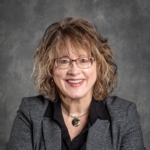 Jeannie Krull, MS/CCC-SLP, ATP, CAPS | Executive Director, ATAP
Jeannie Krull, MS/CCC-SLP, ATP, CAPS | Executive Director, ATAP
Supporting Partner:
Jeannie Krull, MS/CCC-SLP, ATP, CAPS, is an ASHA certified speech/language pathologist, a RESNA certified Assistive Technology Professional (ATP), and a Certified Aging in Place Specialist (CAPS) who has worked with people all ages and disabilities since 1991.
As of January 2025, she is the Executive Director of ATAP, the national Association of Assistive Technology Act Programs. ATAP plays a crucial role in supporting a nationwide network of Assistive Technology Programs, which help individuals with disabilities and service providers access essential assistive technology (AT) for education, employment, and independent living.
Jeannie spent the first part of her career working for a private practice as a speech pathologist, specializing in many areas, in multiple settings to include clinics, schools, hospitals, and nursing homes.
From 2000 to 2025, she worked for North Dakota Assistive, a non-profit which houses the state’s Assistive Technology Act program and many other assistive technology-related programs. Her work as an AT Consultant, AT Act Program Director, and Assistant Executive Director focused on changing systems and policies, educating, presenting, collaborating, advocating, and helping people with disabilities find life-changing assistive technology (AT) solutions to help them live, learn, work, and play.
Most recently, she helped ND Assistive to bring assistive technology assessments to ND Medicaid Waivers and the Money Follows the Person Program. She also helped refine the assessment process and AT device acquisition within these programs.
In addition, she is a 2019 Bush Foundation Fellow, past Chair of the Board of the ATAP, and an ATIA Strand Advisor for the Aging and AT Strand. Jeannie also sits on the USAging/ACL Commit to Connect Advisory Committee.
Laura Rice Aging & AT
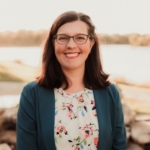 Laura A. Rice, PhD, MPT, ATP |Associate Professor, University of Illinois Urbana Champaign
Laura A. Rice, PhD, MPT, ATP |Associate Professor, University of Illinois Urbana Champaign
Laura A. Rice, PhD, MPT, ATP is an Associate Professor and Associate Head for Graduate Studies in the Department of Health and Kinesiology at the University of Illinois Urbana Champaign. She also serves as the Associate Director of the Center for Health, Aging, and Disability in the College of Applied Health Sciences.
Her research focuses on management of secondary impairments associated with physical disabilities and increasing quality of life and community participation. In addition, Dr. Rice is interested in the development of outcome measures to evaluate functional mobility skills. Dr. Rice’s research is funded by the National Institute on Disability, Independent Living, and Rehabilitation Research, Craig H. Neilsen Foundation, Paralyzed Veterans of America, and National Multiple Sclerosis Society.
Dr. Rice also remains active as a Seating and Mobility Specialist. She is a RESNA certified Assistive Technology Professional and director of the Illini Wheelchair and Scooter clinic. She received her PhD in Rehabilitation Science and Technology from the University of Pittsburgh in 2010 under the direction of Michael Boninger and a M.S. in Physical Therapy and B.S. in Health Sciences from Duquesne University in 2004 and 2003 respectively.
William E. Janes AT for Physical Access & Participation
 William E. Janes, OTD, MSCI, OTR/L | Assistant Research Professor, Department of Occupational Therapy, University of Missouri; Representing the American Occupational Therapy Association (AOTA)
William E. Janes, OTD, MSCI, OTR/L | Assistant Research Professor, Department of Occupational Therapy, University of Missouri; Representing the American Occupational Therapy Association (AOTA)
Supporting Partner: 
William Janes, OTD, MSCI, OTR/L,is an occupational therapist and assistant professor at the University of Missouri. He has served in numerous volunteer leadership roles within AOTA and RESNA. He currently serves on the Editorial Board of ATIA’s journal, Assistive Technology Outcomes and Benefits (ATOB).
Dr. Janes’ work focuses on applications of consumer technologies to address the everyday needs of people living with disabilities. His current projects include a multi-site consortium for GoBabyGo data collection, an interdisciplinary makerspace devoted to inclusively designed assistive technologies, and implementing home-based and wearable sensors to target multidisciplinary care in ALS.
Judith Schoonover AT for Physical Access & Participation
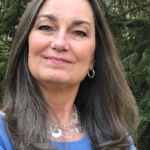 Judith Schoonover, MEd, OTR/L, ATP, FAOTA | Occupational Therapist, Independent Assistive Technology Consultant; Representing Early Intervention & School Special Interest Section, American Occupational Therapy Association (AOTA)
Judith Schoonover, MEd, OTR/L, ATP, FAOTA | Occupational Therapist, Independent Assistive Technology Consultant; Representing Early Intervention & School Special Interest Section, American Occupational Therapy Association (AOTA)
Judith Schoonover, MEd, OTR/L, ATP, FAOTA, is an occupational therapist and former elementary school teacher. She is certified as an assistive technology professional (ATP) by RESNA and was a founding member of the Loudoun County Public Schools Assistive Technology Team. Judith has provided direct services in schools for more than 44 years and is a nationally and internationally recognized speaker presenting on the topics of school-based occupational therapy, transition, literacy, and assistive technology. She has authored numerous articles, and chapters in Early Childhood: Occupational Therapy Services for Children Birth to Five, Occupational Therapy for Children (6th-8th eds.), Best Practices in School Occupational Therapy, Assistive Technologies, and Occupational Therapy and Transitions: A Cross-System Perspective. Judith is a recipient of the Joy Zabala Spirit Award.
Currently, she represents AOTA on the National Joint Committee (NJC) for the Communication Needs of Persons with Severe Disabilities and serves on the editorial board of the Assistive Technology Outcomes and Benefits (ATOB) Journal.
Therese Willkomm AT for Physical Access & Participation
 Therese Willkomm, PhD | Director of ATinNH; Representing Rehabilitation Engineering and Assistive Technology Society of North America (RESNA)
Therese Willkomm, PhD | Director of ATinNH; Representing Rehabilitation Engineering and Assistive Technology Society of North America (RESNA)
Supporting Partner:
Dr. Therese Willkomm, PhD, is the Director of New Hampshire’s State Assistive Technology Program with the Institute on Disability at the University of New Hampshire (UNH). She is clinical associate professor emeritus in the Department of Occupational Therapy. She developed, coordinated, and taught the assistive technology courses for the Graduate Certificate Program in Assistive Technology for 23 years.
Dr. Willkomm is known nationally and internationally for her innovative strategies for creating solutions in minutes. She has designed and fabricated more than two thousand solutions for individuals with disabilities to maximize independence in all life functions. She has presented her work in 42 states, 10 foreign countries, and three U.S. Territories and has authored more than 22 publications including her recent book, Assistive Technology Solutions in Minutes Book 3: – “Make Stuff and Love People”.
Lori Geist Augmentative & Alternative Communication | Research
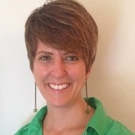 Lori Geist, PhD, CCC-SLP | Assistant Professor at the Center for Literacy & Disability Studies, Department of Health Sciences, School of Medicine, University of North Carolina at Chapel Hill
Lori Geist, PhD, CCC-SLP | Assistant Professor at the Center for Literacy & Disability Studies, Department of Health Sciences, School of Medicine, University of North Carolina at Chapel Hill
Lori Geist, PhD, CCC-SLP, is an assistant professor at the Center for Literacy and Disability Studies in the Department of Health Sciences in the School of Medicine at the University of North Carolina at Chapel Hill. Prior to joining the research faculty at UNC, she worked in direct service, consultation, and product development, concentrating on intervention approaches that target communication, language, and literacy outcomes for individuals with complex communication needs.
Her research interests center on leveraging technology in the delivery of effective intervention. Lori is a lead investigator and director on multiple research projects, including Project Converse (PI), Building Bridges (co-PI), and Project Open (co-PI).
Amy Goldman Augmentative & Alternative Communication
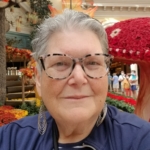 Amy Goldman | Past President, US Society for AAC (USSAAC)
Amy Goldman | Past President, US Society for AAC (USSAAC)
Supporting Partner:
Amy S. Goldman is currently past president of the US Society for AAC (USSAAC). She previously was technical assistance specialist with the national AT3 Center, and the co-executive director of the Institute on Disabilities, University Center of Excellence in Developmental Disabilities at Temple University.
A licensed speech-language pathologist, Amy’s career has focused on the area of augmentative and alternative communication (AAC) and especially, access to AAC for people with intellectual and developmental disabilities. She is a member of the National Joint Committee for the Communication Needs of Persons with Severe Disabilities (“NJC”) representing USSAAC.
Abygail Marx Augmentative & Alternative Communication
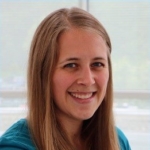 Abygail Marx, MS, CCC-SLP | Associate AAC Specialist, Bridging Voice; Representing ASHA SIG 12: AAC
Abygail Marx, MS, CCC-SLP | Associate AAC Specialist, Bridging Voice; Representing ASHA SIG 12: AAC
Abygail “Abby” Marx is a speech language pathologist (SLP) who has spent her career supporting individuals who use augmentative and alternative communication (AAC).
Previously she worked for more than 12 years in the AAC Programs at the Waisman Center, University Center for Excellence in Developmental Disabilities (UCEDD). Abby provided direct AAC evaluation and therapy services to clients across the lifespan. She also worked in several programs that supported capacity building efforts around AAC through training and consultation activities with families, caregivers, and other professionals, including both pre- and in-service providers.
Abby recently joined the team at Bridging Voice, which is a non-profit organization that supports people with ALS by providing holistic support for all their technology needs related to communication and computer access. Bridging Voice provides education, consultations, technical support and customizations, and all services are free of charge.
Abygail is Certified in Clinical Competence by the American Speech Language and Hearing Association (ASHA). She received her Bachelor’s and Master’s degrees at the University of Wisconsin, Madison. She has completed additional interdisciplinary leadership training through the Maternal and Children Health – Leadership Education in Neurodevelopmental & Related Disabilities (MCH-LEND) program in graduate school, and through the ASHA Leadership Development Program (LDP 2020 Cohort).
Abby is also involved in advocacy and initiatives around AAC through volunteer positions at the state and national level, including serving as Associate Chair for the ASHA Special Interest Group 12 (AAC) Coordinating Committee.
Carole Zangari Augmentative & Alternative Communication
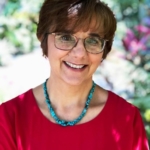 Carole Zangari | Professor; Executive Director, NSU Center for Autism and Related Disabilities
Carole Zangari | Professor; Executive Director, NSU Center for Autism and Related Disabilities
Dr. Carole Zangari is a professor in the Speech Language Pathology department at Nova Southeastern University where she teaches master’s/doctoral courses in AAC, coordinates the AAC Lab, and supports graduate student clinicians. In addition, Dr. Zangari serves as the Executive Director of the Broward satellite of the University of Miami-Nova Southeastern University Center for Autism and Related Disabilities (UM-NSU CARD).
Dr. Zangari is a frequent presenter on AAC topics at international and national conferences. Dr. Zangari is the co-editor of Practically Speaking Language, Literacy, and Academic Development for Students with AAC Needs and co-author of TELL ME: AAC in the Preschool Classroom and TELL ME Más: CAA en el Aula Preescolar. She blogs on Instagram.
Dr. Zangari can be reached via her website or on social media, including Twitter, Facebook, Pinterest, and Instagram.
Cynthia Curry Education & Learning: Early Intervention – 12/Higher Education
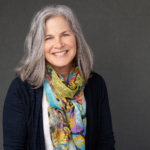 Cynthia Curry | Associate Director in the TA Division of the Institute for Disability Research, Policy & Practice (IDRPP), Utah State University
Cynthia Curry | Associate Director in the TA Division of the Institute for Disability Research, Policy & Practice (IDRPP), Utah State University
Supporting Partner:
Cynthia Curry works across two units of the Institute for Disability Research, Policy & Practice (IDRPP) to advance digital accessibility in education, WebAIM, and the Center for Technical Assistance for Excellence in Special Education (TAESE). She has provided state, regional, and national training and technical assistance (TA) on digital accessibility, AT, and AEM since 2000. Having started her career as a secondary science teacher, Cynthia’s primary interests lie in improving access to digital educational materials and technology by learners who use AT. She has enjoyed diverse roles in the pursuit of more accessible digital learning environments in Pre-K–12 and higher education.
With the Maine Department of Education’s Learning Technology Initiative, she served as a statewide technology integration mentor for 10 years, providing training to districts on making 1:1 technology programs accessible to AT users. For Maine CITE, the state’s AT Act Program, she led nearly 10 years of statewide training and TA on the early implementation of the NIMAS specification and the acquisition and use of AIM/AEM.
At the University of Southern Maine, Cynthia was a lecturer and director of a five-year personnel development project funded by the Office of Special Education Programs (OSEP), Transforming Teaching through Collaborative Teacher Education. During this time, she founded the Maine Teacher Preparation Collaborative to support programs across the state to improve the integration of inclusive technology in special education and general education pathways. Cynthia served as Disability Services Coordinator and an instructional designer at the University of New England before joining CAST’s TA team in 2016. During seven years at CAST, she provided leadership to CAST’s OSEP-funded TA centers, the National AEM Center and the Center on Inclusive Technology & Education Systems (CITES).
In 2024, she joined Utah State University to bridge opportunities between WebAIM and TAESE for new and innovative digital accessibility services for educational agencies across the country.
Kelly Fonner Education & Learning: Early Intervention – 12/Higher Education
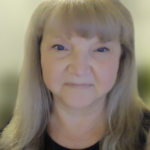 Kelly Fonner | Assistive Technology Consultant/Special Education Teacher
Kelly Fonner | Assistive Technology Consultant/Special Education Teacher
Kelly Fonner, MS, is a self-employed consultant and trainer in assistive and educational technology. She has a BS in Special Education from Millersville University and an MS in Educational Technology with emphasis in Rehabilitation/Special Education Technology from The Johns Hopkins University. Her continuing education and research has been in the area of adult education and special education technology at the University of Wisconsin Milwaukee. She holds an Assistive Technology Applications Certificate of Learning from California State University – Northridge.
Kelly has been a teacher, para-educator, instructional media specialist, assistive technology (AT) specialist, and is currently a self-employed consultant in assistive and educational technology. In these roles, she has worked for the public school system as well as private, non-profit organizations, a statewide AT project, and has been an instructor in university courses on AT. Kelly is also the family member of individuals with disabilities.
Since 1986, Kelly has presented at schools, conferences, and to families in 48 states and internationally in Australia, Canada, and South Africa. She speaks on a wide range of topics including AT assessment and implementation strategies, augmentative communication, computer access, electronic literacy, and study skills. Each year she works with approximately 50 school-based teams supporting students and their teams in the implementation of AAC and electronic literacy in the classroom.
Kelly is available to do seminars, webinars, consultations, and workshops. Her website is kellyfonner.com.
David Banes International Liaison
David Banes | Director, DaveBanesAccess & General Secretary, DATEurope
Supporting Partner:
David Banes is General Secretary of DATEurope, Director of David Banes Access and Inclusion Services and co-founder of Global symbols, having worked in assistive technology (AT) for the past 35 years leading AT services in Europe and the Middle East, including Mada in Qatar from 2010–16. He now works around the globe, including projects with low- and medium-income countries in Eastern Europe, Africa, and South Asia to support implementation of access and inclusion from policy to practice through capacity building.
He has a special interest in both emerging and low-cost technologies and their impact upon people with a disability, including the use of AI to augment communication, emerging technologies and mobility, technology and self-management of mental health, addressing hidden disabilities including communication needs and autism and the use of innovation to build resilient AT and AAC services during the pandemic.
David regularly writes about the tools and techniques. Recent publications include emerging technologies and the impact on universal design for learning, economic return on investment in AT, and the potential impact of frugal innovation on the provision of assistive products. He is a founder and director of DATEurope, the Digital Assistive Technology Industry Association for Europe.
David speaks widely as a keynote and workshop facilitator on assistive and accessible technology, including at the Zero Project, ICCHP-AAATE, ATIA, ATAAC, and a range of bespoke events online and in person. He is on the editorial board of Assistive Technology Outcomes and Benefits (ATOB), Journal of Assistive Technologies, the Journal of Rehabilitation, and the Journal of Disability and Rehabilitation: Assistive Technology. He is an adjunct Fellow of the University of Southampton.
Rob Carr Mainstream Accessible Technologies
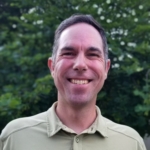 Rob Carr | Strategic Accessibility Coordinator, WebAIM
Rob Carr | Strategic Accessibility Coordinator, WebAIM
Supporting Partner:
Rob Carr is the Strategic Accessibility Coordinator at WebAIM. Rob has been in the digital accessibility space since 2010. He has spent loads of time training, consulting, and learning about digital accessibility topics large and small.
Rob has worked with thousands of individuals and dozens of organizations on everything from accessibility in a single PDF to integrating accessibility into organizations’ digital strategies. Rob presents at national conferences, organizes the occasional conference, and tries to be more active and less snarky on LinkedIn.
Mike Marotta Mainstream Accessible Technologies
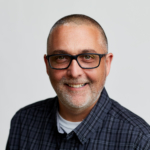 Mike Marotta, ATP | Director, Richard West AT Advocacy Center
Mike Marotta, ATP | Director, Richard West AT Advocacy Center
Mike Marotta is a RESNA Certified Assistive Technology Professional and the 2017 ISTE Inclusive Learning Network Outstanding Educator. Mike is a nationally and internationally recognized presenter providing practical training to professionals interested in assistive and inclusive technology. In addition, Mike is an adjunct professor at Ramapo College of New Jersey, teaching Masters level educators in Assistive Technology and Universal Design for Learning.
Mike is the Director of the Richard West Assistive Technology Advocacy Center and serves on both the CAST Accessible Educational Materials and the Center on Inclusive Technology and Education Systems (CITES) Advisory Boards. Mike is also the founder of EdcampAccess NJ, co-moderator of the weekly Twitter #ATchat and a Book Creator Ambassador. Mike is one of the co-authors of the ISTE book, Inclusive Learning 365: Edtech Strategies for Every Day of the Year.
Anya Evmenova Research
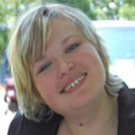 Anya Evmenova, PhD | Professor, George Mason University; RRepresenting the Assistive Technology Outcomes and Benefits Research Journal (ATOB)
Anya Evmenova, PhD | Professor, George Mason University; RRepresenting the Assistive Technology Outcomes and Benefits Research Journal (ATOB)
Anya Evmenova, PhD, is a professor of special education in the College of Education and Human Development at George Mason University. She teaches undergraduate, master, and doctoral courses in assistive technology (AT), special education, and research methods. She is an active contributor to the field of special education and AT regularly publishing and presenting at national and international conferences. Design and research of technology-based interventions in academic settings is the primary focus of her work.
Dr. Evmenova’s is currently a PI on the technology development project, WEGO-MEGA: Writing Efficiently with Graphic Organizers – Motivating with Educational Games. Dr. Evmenova’s research interests include the use of assistive and instructional tools for improving access to general education curriculum for students with various abilities and needs, Universal Design for Learning, as well as online teaching and learning.
Dr. Evmenova is Editor-in-Chief of the Assistive Technology Outcomes and Benefits (ATOB) research journal.
Teresa Goddard Transition & Workplace Accessibility
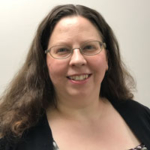 Teresa Goddard | Lead Consultant, Job Accommodation Network (JAN)
Teresa Goddard | Lead Consultant, Job Accommodation Network (JAN)
Teresa joined the Job Accommodation Network (JAN) staff as a program assistant in March 2008 and joined the Motor Team as a consultant in August 2008. She has now transitioned to JAN’s sensory team and fields questions from employees and employers regarding their rights and responsibilities under the Americans with Disabilities Act (ADA) and assists in identifying accommodation solutions for employees with sensory impairments.
Teresa’s professional experience includes work as an educational speech-language pathologist and as an EFL instructor in Aichi Prefecture, Japan, In addition to classroom teaching in Japan, she led continuing education workshops on collaborative instructional techniques and cross-cultural understanding.
Teresa holds a bachelors degree in Speech Pathology and Audiology and a masters degree in Speech Pathology from West Virginia University’s College of Human Resources and Education. She has earned 45 hours above the masters’ level with elective course work in augmentative and alternative communication, behavior disorders, and reading. Teresa’s research interests include assistive technology and cross-cultural perspectives on disability services.
Luis Pérez Transition & Workplace Accessibility
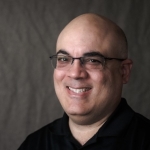 Luis Pérez, PhD | Disability and Digital Inclusion Lead, CAST
Luis Pérez, PhD | Disability and Digital Inclusion Lead, CAST
Supporting Partner:
As the Disability & Digital Inclusion Lead for CAST, Luis promotes the creation, delivery, and use of high quality accessible educational materials and technologies to support equitable learning opportunities for all students. Luis is embedded with the Postsecondary and Workforce Development group at CAST that works to increase access to middle- and high-income careers for populations underrepresented in the workforce, including people with disabilities. Luis’s perspective is informed by his own lived experience as a person with a disability and multilingual learner.
Luis was recognized with an International Society for Technology in Education (ISTE) Making It Happen! Award in 2020. Other recognitions include Apple Distinguished Educator (2009) and Google Certified Innovator (2014). He has published three books on accessibility, mobile learning, and UDL: Mobile Learning for All (Corwin Press), Dive into UDL (ISTE), and Learning on the Go (CAST Publishing).
Sarahelizabeth Baguhn Vision & Hearing Technologies
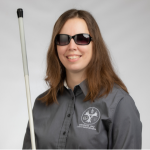 Sarahelizabeth Baguhn, PhD | Research Specialist, American Foundation for the Blind;
Sarahelizabeth Baguhn, PhD | Research Specialist, American Foundation for the Blind;
Supporting Partner:
Sarahelizabeth Baguhn, PhD, has taught Assistive Technology skills for a public-school district and to adults in the community as a private contractor. She holds ACVREP’s CATIS & COMS as well as a Wisconsin TVI license. Now a Research Specialist for the American Foundation for the Blind she studies the interactions between blindness and other areas of American life, including barriers to digital inclusion and the interactions between artificial intelligence and disability. When not researching or teaching electronic travel aids or other classes for Western Michigan University, she enjoys hiking the Appalachian Trail with friends, geocaching, and Pokémon Go. Dr. Baguhn serves on the board of directors for ACVREP, the subject matter expert committee for Assistive Technology with ACVREP, as well as the Advisory Council for Audio Description.
Rachael Sessler Trinkowsky Vision & Hearing Technologies
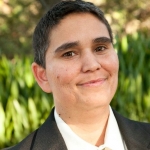 Rachael Sessler Trinkowsky, PhD, CRC, CATIS | Assistive Technology Program Coordinator, University of Massachusetts Boston – Vision Studies; Representing ACVREP
Rachael Sessler Trinkowsky, PhD, CRC, CATIS | Assistive Technology Program Coordinator, University of Massachusetts Boston – Vision Studies; Representing ACVREP
Supporting Partner:
Rachael Sessler Trinkowsky, PhD, CRC, CATIS, CPACC, is the assistive technology program coordinator for the Vision Studies department at the University of Massachusetts Boston (UMass Boston). Additionally, she is an adjunct faculty member at the University of Illinois Chicago (UIC) in its Assistive Technology Certificate Program.
Rachael holds a B.A. degree in Special Education and a Masters of Health Science in Rehabilitation Counseling from the University of Florida. She also earned an Educational Specialist and a Ph.D. from Nova Southeastern University’s College of Engineering and Computing in Computing Technology in Education. Her dissertation topic focused on accessibility awareness and practices in online learning environments. Rachael is serving as the Accessibility Committee Chair for the Association for Education and Rehabilitation of the Blind and Visually Impaired. She is a Google Chromebook Accessibility Ambassador.
Rachael has been a certified rehabilitation counselor (CRC) since 1999. She was the recipient of the Florida Association for Education and Rehabilitation of the Blind and Visually Impaired (Florida FAER) award for Outstanding Rehabilitation Professional for the Blind Award (2017), as well as the FAER Innovator of the Year Award (2021). She was honored to be a member of the Subject Matter Expert (SME) Committee for the development of the much-needed specialization, called Certified Assistive Technology Instructional Specialist for People with Visual Impairments (CATIS) through the Academy for Certification of Vision Rehabilitation & Education Professionals (ACVREP). Rachael is also a Certified Professional in Accessibility Core Competencies (CPACC) from the International Association of Accessibility Professionals (IAAP).
Questions?
Contact education@atia.org.





